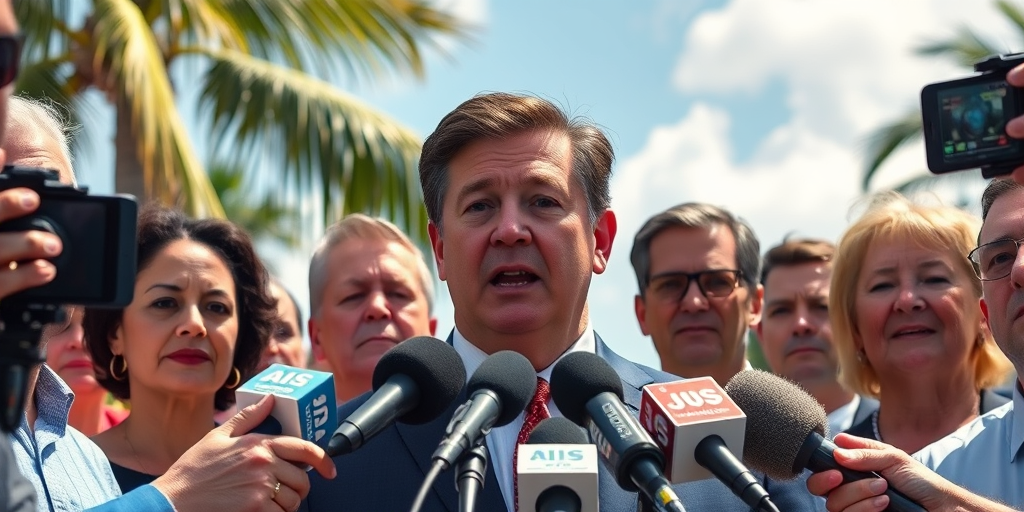Florida Governor Ron DeSantis Proposes End to Diversity Visa Lottery: A Pivot in American Workforce Strategy
Florida Governor Ron DeSantis has reignited a crucial conversation regarding U.S. immigration policy by proposing the termination of the Diversity Immigrant Visa program, commonly known as the Diversity Visa lottery. This decision could bring significant changes to the landscape of the American workforce, raising concerns about diversity and innovation in various sectors, especially in regions like Silicon Valley, healthcare centers, and educational institutions reliant on global talent influx.
Understanding the Diversity Visa Lottery
Established under the Immigration Act of 1990, the Diversity Visa lottery aims to diversify the immigrant population in the United States by annually selecting up to 55,000 individuals from countries with historically low rates of immigration to the U.S. The program has been pivotal in bringing skilled labor into the country, aiding sectors that suffer from a chronic shortage of professionals. These sectors include STEM (Science, Technology, Engineering, and Mathematics), healthcare, and various niche areas within technological innovation.
Proponents of the program argue that it bolsters the American economy by filling skill gaps and encouraging diversity of thought and culture, essential ingredients for robust innovation. Critics like DeSantis, however, view the lottery as outdated and argue that its basis on geographical representation rather than merit undermines its value.
Local Impact: Potential Consequences for U.S. Workforce
The potential repercussions of ending the Diversity Visa lottery extend beyond administrative changes; they signal a philosophical shift in the nation’s workforce policy. Experts in regions that heavily depend on international talent foresee longer hiring cycles and increased recruitment costs in critical areas of the economy. For instance, tech hubs such as Silicon Valley and healthcare institutions across the country might face formidable challenges in securing the necessary workforce to sustain their activities and innovation.
“The diversity in our workforce is the backbone of our innovation capacity,” notes Dr. Lisa Hernandez, a tech industry analyst based in California. “Removing this vital avenue of diverse talent could significantly stifle the creative processes that keep our industries ahead globally.”
Locally, residents and businesses that rely on the fresh perspectives and specialized skills brought by Diversity Visa recipients express concerns about potential limitations on dynamic workforce contributions. In the education sector, for instance, the influx of educators from varied backgrounds has enriched teaching methodologies, enabling American educational institutions to remain competitive globally.
A Broader Context: How Does This Fit with Previous Immigration Policies?
This proposed change in the Diversity Visa lottery aligns with broader themes in recent U.S. immigration policy shifts that emphasize merit-based over diversity-oriented frameworks. There has been an increased focus on enhancing the current workforce through skilled immigration while controlling the pathways for visa recipients.
In recent years, heightened discourse around H1B visas, student visas, and employment-based green cards has reflected a similar trend. While the intention is to optimize skilled worker intake, critics worry that neglecting diversity in the immigration process could lead to a homogenized workplace, less equipped for creative problem-solving and cultural intelligence.
The Crucial Role of International Talent
The decision to eliminate the Diversity Visa lottery comes at a time when industries across the nation are grappling with significant talent shortages. Fields such as engineering, information technology, healthcare, and academic research thrive on diverse inputs not just in terms of skills but cultural insights and diverse problem-solving approaches.
Jack Thompson, CEO of a leading biotech start-up, expressed his concerns: “We’re competing in a global market where innovation is king. Without the diversity of ideas, we’re at risk of falling behind. The Diversity Visa lottery has been a critical element in maintaining our edge.”
Moreover, entrepreneurial sectors benefit as visa recipients often become small business owners and job creators themselves, fueling local economies and broadening employment opportunities. The economic ripples of this program extend well beyond its immediate participants.
Perspectives on the Ground: Balancing Growth and Policy
While the official narrative from DeSantis and similar voices argues for a re-evaluation of the visa system based on meritocratic principles, opposing views urge for balance and integration of diversity as a growth catalyst. Local industry leaders, city officials, and advocacy groups are expected to engage in dialogs addressing the multi-faceted implications of this shift.
“We should not overlook the human impact of this policy change,” insists Maria Gonzalez, an immigration advocate. “At the heart of it, we are dealing with lives, families, and aspirations, and we must consider the broader socio-economic benefits diversity brings.”
Looking Forward: Community Support and Engagement
As the debate unfolds, it is crucial for communities to remain engaged. Stakeholders across sectors are encouraged to provide input and advocate for comprehensive strategies that can holistically address workforce needs while valuing diversity.
Organizations and businesses impacted by the potential end of the Diversity Visa lottery must look towards alternative solutions, lobbying for balanced immigration reforms that ensure economic vitality and cultural richness.
For residents and community members seeking further information or wishing to express their perspectives, local government offices and advocacy groups offer platforms for dialogue and discussion. Staying informed and involved could influence decisions that shape the workforce for future generations.
In conclusion, the proposal to end the Diversity Visa lottery is not a mere administrative shift; it challenges the very integration of immigration and workforce development. As Woke News continues to monitor the situation, it remains imperative to balance innovation and inclusivity in crafting policies that embrace global talent benefits at local and national levels.







